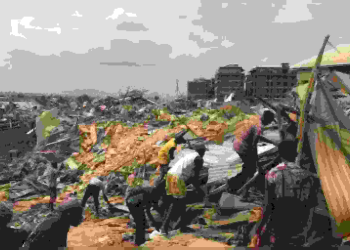Ethiopian authorities have initiated urgent evacuation procedures in the northeastern Afar region following concerning volcanic activity at Mount Dofen, a long-dormant volcano that has recently exhibited signs of reawakening.
The Afar Region Disaster Risk Management office reported that steam eruptions have been observed since Thursday, prompting immediate precautionary measures to ensure civilian safety. The situation has already caused significant infrastructure damage, with volcanic mud flows creating substantial fissures in major roadways and inflicting severe damage to numerous properties throughout the region.
In response to these developments, regional authorities are coordinating the relocation of thousands of residents to designated safe zones within the Afar region. This careful approach to population safety reflects the complex geological challenges faced by this part of Ethiopia, which is known for its harsh climate and volcanic activity.
However, Professor Atalay Ayele from the Institute of Geophysics Space Science and Astronomy at Addis Ababa University offers a measured perspective, noting that the current steam eruptions may not necessarily escalate into a full volcanic event. This scientific insight provides important context for understanding the current situation.
The Afar region, characterized by its extreme temperatures and arid conditions, has a documented history of geological instability, including volcanic activity and seismic events. These natural challenges compound existing environmental pressures in the region, which has previously faced multiple displacement scenarios due to drought, famine, and flooding incidents.
This evacuation represents the latest in a series of environmental challenges for this vulnerable region, highlighting the ongoing need for robust disaster management strategies in one of Ethiopia’s most geologically active areas.






